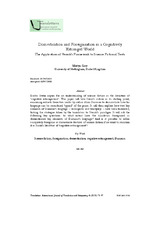Mostrar el registro sencillo del ítem
Domestication and Foreignisation in a Cognitively Estranged World: The Application of Venuti’s Framework to Science Fictional Texts
| dc.contributor.author | Gray, Martyn | |
| dc.date.accessioned | 2020-10-09T11:00:32Z | |
| dc.date.available | 2020-10-09T11:00:32Z | |
| dc.date.issued | 2020 | |
| dc.identifier.issn | 2605-2954 | |
| dc.identifier.uri | http://hdl.handle.net/10396/20514 | |
| dc.description.abstract | Darko Suvin argues for an understanding of science fiction as the literature of ‘cognitive estrangement’. This paper will take Suvin’s notion as its starting point, examining extracts from two works by author Alain Damasio to demonstrate how his language can be considered ‘typical’ of the genre. It will then explore how two key elements of Damasio’s language – neologisms and wordplays – have been translated, linking the strategies taken by the translators to Venuti’s paradigm. It will ask the following key questions: to what extent have the translators foreignised or domesticated key elements of Damasio’s language? And is it possible to either completely foreignise or domesticate features of science fiction if we want to maintain it as Suvin’s literature of ‘cognitive estrangement’? | es_ES |
| dc.format.mimetype | application/pdf | es_ES |
| dc.language.iso | eng | es_ES |
| dc.publisher | UCOPress | es_ES |
| dc.rights | https://creativecommons.org/licenses/by/3.0/ | es_ES |
| dc.source | Transletters. International Journal of Translation and Interpreting 4, 75-97 (2020) | es_ES |
| dc.subject | Science fiction | es_ES |
| dc.subject | Foreignisation | es_ES |
| dc.subject | Domestication | es_ES |
| dc.subject | Cognitive estrangement | es_ES |
| dc.subject | Damasio | es_ES |
| dc.title | Domestication and Foreignisation in a Cognitively Estranged World: The Application of Venuti’s Framework to Science Fictional Texts | es_ES |
| dc.type | info:eu-repo/semantics/article | es_ES |
| dc.relation.publisherversion | https://www.uco.es/ucopress/ojs/index.php/tl/index | es_ES |
| dc.rights.accessRights | info:eu-repo/semantics/openAccess | es_ES |

